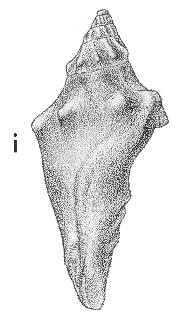
Revised descriptions of New Zealand Cenozoic Mollusca from Beu and Maxwell (1990)

 | Revised descriptions of New Zealand Cenozoic Mollusca from Beu and Maxwell (1990) | 
|
  (Pl. 30i): Marwick's largest (figured) syntype, GS1037, S28/f6446, Hurupi Stream, Palliser Bay, southern Wairarapa, early Tongaporutuan (TM6810, GNS) |
Beu & Maxwell (1990): Chapter 13; p. 268; pl. 30 i.
Synonymy: Alcithoe hurupiensis Marwick 1926a, p. 292; Alcithoe (Alcithoe) hurupiensis, Beu & Maxwell 1990, p. 268, pl. 30i
Classification: Volutidae: Zidoninae
Description: Moderately large for genus (70-85 mm high), elongate, with moderately short, conic spire (between third and half height of aperture) and long, gently contracted last whorl; low, wide fasciole margined by narrow ridge. Sculpture commences as low, evenly spaced, narrowly crested axial ridges on earliest spire whorls seen (apex damaged in all specimens), gradually down the spire each axial ridge developing nodule at lower 0.4 of whorl height, and ridge gradually becoming weaker above and below nodule, so the only sculpture on last whorl is 7 large, smooth, narrowly pointed nodules around shoulder, producing strongly concave sutural ramp. Outer lip ascending to apex of shoulder nodules over last quarter-whorl, thickened and apparently flared (broken in all material). Inner lip with low parietal callus and 4 narrow, prominent columellar plaits. Protoconch not seen but presumably as in A. arabica (Gmelin), large, cylindrical, of about 2 smooth whorls, with wide, blunt apex.
Comparison: Marwick (1926a, p. 292) discussed the confused locality of his largest syntype of Alcithoe hurupiensis; later collections leave no doubts that the specimen came from the Hurupi Stream area of eastern Palliser Bay. A. hurupiensis was apparently an intermediate member of the "typical" Alcithoe lineage, between A. turrita (Altonian; Pl. 21s) and A. arabica (Pl. 49d), and is easily recognised by its wide form and its almost smooth surface, apart from particularly large, sharp nodules around the shoulder angle.
Distribution: Early Tongaporutuan, "Hurupi faunas" in southern Wairarapa only. Although this is reasonably common at Hurupi Stream and nearby localities in eastern Palliser Bay, complete shells have not been collected, and it seems not to occur in any other areas. All localities are in near-shore, inner-shelf sandstone with diverse Mollusca, much as is inhabited now by the common Nukumaruan to living species A. arabica.
Cite this publication as: "A.G. Beu and J.I. Raine (2009). Revised
descriptions of New Zealand Cenozoic Mollusca from Beu and Maxwell (1990). GNS
Science miscellaneous series no. 27."
© GNS Science, 2009
ISBN
978-0-478-19705-1
ISSN 1177-2441
(Included with a PDF facsimile file
copy of New Zealand Geological Survey Paleontological Bulletin 58 in CD version
from: Publications Officer, GNS Science, P.O. Box 30368 Lower Hutt, New
Zealand)